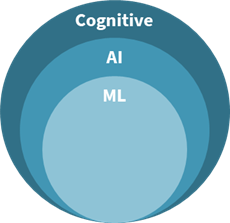
Cognitive, AI, Machine Learning … to Deep Learning, Neural Nets, Natural Language Processing and Entity Recognition … to Siri, Alexa, Cortana, Google Home, Watson … and just for fun, to Skynet, The Matrix, Westworld, and my personal favorite, Iron Man’s J.A.R.V.I.S. 
With the onslaught of (enter your favorite term(s) from the above themes) nearly everywhere we turn in business, home and entertainment, have you ever found yourself trying to make sense of it all? Trying to figure out how it all relates – if it even does?
Allow me to be your guide on this journey of definition and zeroing into the specific areas that we're focused on at Kingland, and along the way we can have some fun with interesting analogies and relatability over to the home and entertainment arenas.
First things first though – How do we define Cognitive, AI, and Machine Learning, and why do they seem to be used almost interchangeably in the market? Starting off with a simple visual primer representing Kingland’s point of view should help:
Cognitive
Cognitive broadly represents a superset of human-decision-assistance technology capability above AI that tends to also include functionality from the analytics realm. It attempts to “humanize” technological advances by relating them more to human cognition and activities than any of the other concepts. The key here is that Cognitive systems assist us with our decisions, rather than simply and directly making the decision for us. In the market, Cognitive has largely been IBM’s terminology of choice when marketing their capability in the space, going back to 2011 and Watson’s star turn in Jeopardy. In fact, while the diagram above represents how Kingland has been thinking about terminology and capabilities in the space, IBM has had a similar view.

Artificial Intelligence
AI has gained momentum as the terminology most commonly used in the market, and it generally represents a superset of technology grouping above Machine Learning. AI has come to represent the technological advancements in everything from ...
AI also typically includes all of the “endpoint” agents involved in surfacing such technological advancements to a level of consumer usability. Think chatbots, robotics, home assistants, self-driving vehicles of the future, and up to and including all of the software and services available for development leveraged within broader technology ecosystems.
For further evidence of the solidifying usage of AI terminology in the market, let's take a look at a couple of examples from the "Top 1%" tech companies. Microsoft has had a big push recently in marketing their AI capabilities. I can't believe how many times I've seen their commercials now. Even IBM – typically heavy in the usage of Cognitive terminology in the past – has steadily transitioned from Cognitive to AI in their marketing (https://www.ibm.com/services/artificial-intelligence), often using them interchangeably. AI is squarely in their website URL as well as in the Watson Artificial Intelligence and Data Platform Services offering naming.
Machine Learning
Machine Learning sits as a more narrowly focused subset grouping of capability within AI, generally representing the leverage of specific models and algorithms to provide insights into recommendations and decisions that are based upon large, obtainable datasets. It has a more direct, “in the weeds” statistics and engineering feel to it, and envelops deeper references to the particular models and algorithms employed for learning from data:
Over the past 10 to 15 years, much of this had been grouped under the Predictive Analytics marketing umbrella. Today, with the explosion of Cognitive/AI/ML in the market, it is instead grouped under Machine Learning.
The Avengers, AI, and the Real World
To close with a fun pop culture reference, I’ll refer back to one of my favorite scenes in the first Avengers movie from 2012. When Iron Man Tony Stark is diverting the “nuke” into space before it can impact New York City, J.A.R.V.I.S. brings forth a recommendation, “Shall I try Miss Potts?”. With one very simple sequence and dialog line in the script, we witness great Machine Learning (input = calculated slim chance of survival, leads to output = recommend contacting closest friends/family), great AI (unprecedented voice interaction and personal assistantship of the J.A.R.V.I.S. technology), and great Cognitive (Stark and J.A.R.V.I.S. working together on the decision to call Pepper Potts, based on the scenario unfolding). Ties it all together in one simple interaction!
How do you differentiate among Cognitive, AI and Machine Learning? Stay tuned to future blogs as I dive deeper into the Kingland Platform and where our technology investments fit in this overall space.
These Stories on Text Analytics


No Comments Yet
Let us know what you think